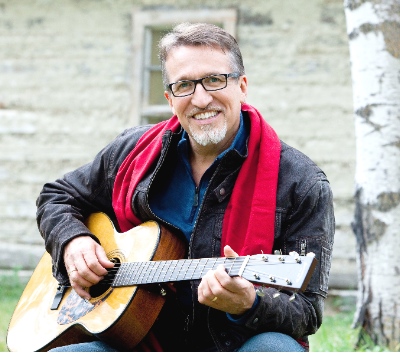Steve Bell will join Regent prof Bruce Hindmarsh for a free public lecture July 9 on Hymns and the Christian Spirit: A Short History of Song and Devotion. Following are some of his thoughts on psalms, music-making, culture and creativity.
I’ve just finished reading Andy Crouch’s very fine book Culture Making, which ends with a quote from Psalm 90 – the ancient poem-prayer which inspired the song that launched my solo career 25 years ago, back in 1989:
May the favour of the Lord
Rest upon us and our land
And establish for us all
The work of our hands
Yes, the work of our hands …
Culture, for Crouch, is simply what we make of the world. Be it language, ceremony, song, quilts, paved roads, pies, poems or . . . porn, there is something in us (the inherent image of God perhaps) that relentlessly wants to take the stuff of life and make something of it. And every time we do, we open up new horizons for either the flourishing or the diminishing of life.
Therefore, culture needs to be carefully discerned, and sometimes roundly rejected. But ultimately, the best way to challenge bad culture is to create good culture, the best of which, Crouch surprisingly argues, may well become the furniture of heaven.
Christianly speaking – emboldened by the recollection of exodus and resurrection – we are simply “free to make the best we can of the world, in concert with our forebears and our neighbours.” Of course, culture is not by definition sacrosanct. Artifacts that brought newness and vitality a hundred years ago, may be wreaking havoc today. Loving discernment is an ongoing feature of good culture.
And so, today I’ll work on a song for my new album. I’ll use the creations of others (guitar, stool, capo, coffee) and I’ll sit, sheltered from the coming rains, in a lovingly decorated home that someone else has built. If it’s a good day, my efforts will contribute something good to the landscape. In other words – to borrow a metaphor from Madeleine L’Engle – I hope to feed the lake.
The older I get, the less I care if my contributing tributary is great or small, and the more I simply care that my work flourishes life rather than diminishes it. Because whatever else I believe about God and creation, I believe God is good, and that the ongoing work of creating and cultivating is our happy collaboration in God’s good work.
May the favour of the Lord . . . establish for us all the work of our hands.
Psalm 90
Music and lyric by Steve Bell
Satisfy us in the morning with Your love
Satisfy us in the morning with Your love
That we may sing for joy
And be glad in all our days
Satisfy us in the morning with Your love
Match the days Lord of our sorrow with Your joy
Match the days Lord of our sorrow with Your joy
May Your deeds be always known
To the ones you call your own
Match the days Lord of our sorrow with Your joy
May the favour of the Lord
Rest upon us and our land
And establish for us all
The work of our hands
Yes the work of our hands
Lord for us You have been a refuge from age to age
Lord for us You have been a refuge from age to age
Before the mountains were formed
And the earth and the world brought forth
You are the everlasting Lord
May the favour of the Lord
Rest upon us and our land
And establish for us all
The work of our hands
Yes the work of our hands
 This version of Psalm 90 can be found on Steve’s album Solace.
This version of Psalm 90 can be found on Steve’s album Solace.
This comment is from Steve’s blog.
Steve Bell is a Canadian singer, songwriter, and storyteller with two Juno Awards (Canada’s Grammys) for his music and a Queen Elizabeth II Diamond Jubilee Medal for his vocational commitment and advocacy work. In December 2012, he released his 17th career CD, Keening for the Dawn.
Along with the public lecture, Steve will be teaching Five Traditions and Practices of Prayer along with Bruce Hindmarsh at Regent July 7 – 13:
This course explores five traditions and practices of prayer from the history of the church: the short, frequent prayers of the Desert Fathers; the liturgical collect of the Gregorian Sacramentary and the Book of Common Prayer; the examen of conscience among the Jesuits and the Puritans; the use of imagination in disciplined meditation (composition of place) in the 17th-century meditative devotion of the Jesuits, Frances de Sales and the Puritans; and the Lord’s Prayer as a pattern for personal prayer in Martin Luther and C.S. Lewis. Each day we will examine one of these practices, place it in historical context, and discuss a short classic text from the persons or period concerned. But just like one wants not just to study sheet music, but to play the music for oneself, we will take time together to practice these patterns of prayer during the week and on a guided, quiet retreat over the weekend at the conclusion of the week of classes.
This reference to music is not just a metaphor. Music has always been central to the church’s language of prayer through the centuries. We will be joined throughout the course by the award-winning musician Steve Bell, who will introduce and reflect upon our discussions of prayer in music, lead us in sung prayer, and participate as a thoughtful interlocutor in the course.

